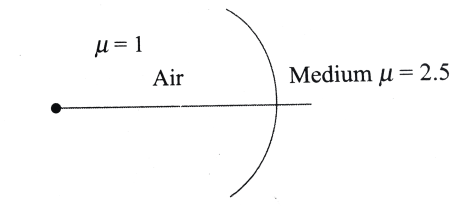Question
Question: A convex spherical reflecting surface with radius R separates a medium having refractive index \(\df...
A convex spherical reflecting surface with radius R separates a medium having refractive index 25 from the air. As an object is moved towards the surface from far away from the surface along the principal axis, its image
A. Changes from real to virtual when it is at a distance R from the surface
B. Changes from virtual to real when it is at a distance R from the surface
C. Changes from real to virtual when it is at a distance 32R from the surface
D. Changes from virtual to real when it is at a distance 32R from the surface
Solution
Use the Lens maker formula to find the image distance. As the refraction is taking place from a rarer to denser medium and from denser to rarer, so use the sign conventions accordingly.
Complete step by step solution:
Let μ1 be the refractive index of the rarer medium around the lens. In the given problem it is air, i.e.μ1=1
Let μ2 be the refractive index of the material of the lens. Here, μ2=25=2.5

Let u be the object distance lying on the principal axis of the lens and v be the image distance from the convex refracting surface. If R is the radius of the curvature of the refracting surface, then by Lens maker formula for a convex lens, we have
vμ2−uμ1=Rμ2−μ1
Putting the given values, in the above equation, we get
⇒v2.5−−u1=R2.5−1
⇒v2.5=R1.5−u1⇒1.5u−R2.5uR
Image will be formed at infinity if 1.5u−R will be zero. This is possible only if u=32R .
The image will be virtual if u<32R .
Hence the image will change from real to virtual when it is at a distance 32R from the surface.
Thus, the correct option is (C).
Note: A convex lens is made up of two convex spherical refracting surfaces. The final image will be formed after two refractions. Lens maker’s formula is a relation that connects focal length of a lens to radii of curvature of the two surfaces of the lens and the refractive index of the material of the lens. It is useful to design lenses of desired focal length using suitable material and surfaces of suitable radii of curvature.
